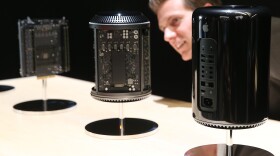
Elise Hu
Elise Hu is a host-at-large based at NPR West in Culver City, Calif. Previously, she explored the future with her video series, Future You with Elise Hu, and served as the founding bureau chief and International Correspondent for NPR's Seoul office. She was based in Seoul for nearly four years, responsible for the network's coverage of both Koreas and Japan, and filed from a dozen countries across Asia.
Before joining NPR, she was one of the founding reporters at The Texas Tribune, a non-profit digital news startup devoted to politics and public policy. While at the Tribune, Hu oversaw television partnerships and multimedia projects, contributed to The New York Times' expanded Texas coverage, and pushed for editorial innovation across platforms.
An honors graduate of the University of Missouri-Columbia's School of Journalism, she previously worked as the state political reporter for KVUE-TV in Austin, WYFF-TV in Greenville, SC, and reported from Asia for the Taipei Times.
Her work at NPR has earned a DuPont-Columbia award and a Gracie Award from the Alliance for Women in Media for her video series, Elise Tries. Her previous work has earned a Gannett Foundation Award for Innovation in Watchdog Journalism, a National Edward R. Murrow award for best online video, and beat reporting awards from the Texas Associated Press. The Austin Chronicle once dubiously named her the "Best TV Reporter Who Can Write."
Outside of work, Hu has taught digital journalism at Northwestern University and Georgetown University's journalism schools and served as a guest co-host for TWIT.tv's program, Tech News Today. She's on the board of Grist Magazine and is a member of the Council on Foreign Relations.
-
The social media giant that made its name on 140-character messages is set to debut on the New York Stock Exchange this week. These numbers help explain why the company is bullish about making millions in advertising.
-
Friday marked one month since the health care exchange marketplace opened. It's unclear how many people have actually enrolled in insurance, how much more the contractors who bungled the software will get paid and whether consumers will be satisfied with the plans they get.
-
This week we learned that the scope of surveillance by the National Security Agency reportedly includes Google and Yahoo data centers. We also explored the subject of kids and technology. And as it heads toward its initial public stock offering, Twitter gave itself a new look.
-
With this dual-purpose device, you won't have to fumble around for a flashlight for trick-or-treating, or the next time the power goes out. The Bulb Flashlight is a low-heat, rechargeable LED bulb that doubles as a handheld flashlight.
-
NPR readers wrote in to share how they're dealing with the technology tension in modern parenting — raising technologically adept kids without making them technologically dependent.
-
Researchers are still learning about the effects of touch-screens on kids. But scientists say that certain kinds of screen time, involving interaction with other people, can help youngsters learn.
-
In this week's tech roundup, the revelations from Edward Snowden that the U.S. spied on its global allies, the Apple iPad event and the ongoing fallout over HealthCare.gov, a system one source described as "too big to succeed."
-
We used the testimonies of the biggest contractors involved with the HealthCare.gov application system to create this guide to how the site's various parts work together, and how the complex system for registering you for health insurance is supposed to work.
-
Does this sound familiar? A national IT project plagued with high-profile problems, integration breakdowns involving contractors, and taxpayers left footing a multimillion-dollar price tag: The scenario's playing out with HealthCare.gov, but a similar one in the U.K. led to major reforms.
-
The Obama administration is sending in computer engineers from inside and outside government to fix the ongoing problems with HealthCare.gov. But the Affordable Care Act's legal deadlines mean that the programmers will be racing against the clock.











